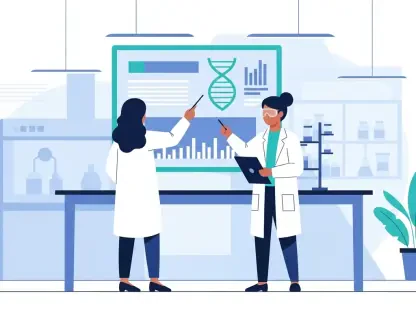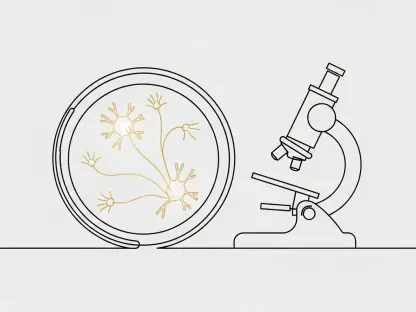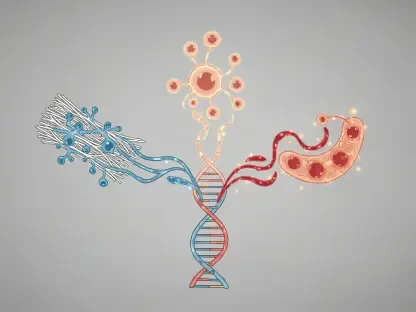Fructose, a common sugar found in many everyday foods, has been discovered to indirectly contribute to the growth of tumors. This potentially transformative finding opens new avenues for cancer treatment. Building upon early twentieth-century research by German physiologist Otto Warburg, which revealed that tumor cells consume more glucose than healthy cells, this new insight focuses on fructose and its role in cancer proliferation. Warburg’s discovery has long been used in cancer diagnostics, utilizing radioactive glucose to highlight tumor cells. However, until now, the exact mechanism through which fructose facilitates cancer growth remained elusive.
Gary Patti’s Groundbreaking Research
The groundbreaking research led by Gary Patti, a biochemist at Washington University in St. Louis, has provided crucial insights into how fructose accelerates tumor growth. Patti’s team conducted experiments where mice with various types of cancer tumors were exposed to high-fructose corn syrup solutions. The mice with tumors that were subjected to a fructose-rich diet exhibited significantly faster tumor growth compared to those on a sugar-free diet. This study clearly demonstrated a strong connection between dietary fructose and the proliferation of cancer cells, marking an essential development in our understanding of tumor biology.
Patti’s findings emphasized that the consumption of high-fructose corn syrup could have severe implications for cancer patients and brought attention to dietary sugars’ broader impact on health. The rapid and significant tumor growth observed in fructose-exposed mice underscored the necessity for a more detailed exploration into fructose’s metabolic pathways and its indirect role in facilitating cancer progression. Patients with cancer might consider controlling their fructose intake, a move that could potentially slow down tumor growth and improve treatment outcomes.
The Mechanism of Fructose Metabolism in Cancer
In an effort to uncover the mechanism behind fructose’s role in cancer progression, researchers observed that cancer cells metabolized very little fructose directly. This unexpected finding led to further investigation into which tissues were responsible for processing the fructose. It was discovered that healthy liver cells, which possess the necessary fructose-metabolizing enzymes, convert fructose into metabolites that can then be utilized by cancer cells. This metabolic activity in the liver provides a supportive environment for tumor growth by supplying essential nutrients.
Gary Patti’s team co-cultured liver cells with cervical cancer cells and added labeled fructose for tracking. The cancer cells showed increased proliferation when grown with liver cells, indicating that the liver’s metabolic conversion of fructose played a pivotal role in supporting tumor growth. Moreover, when an inhibitor of the enzyme ketohexokinase, responsible for fructose metabolism, was applied, the cancer cell growth was notably reduced. This provided further evidence that liver cell metabolism of fructose is crucial for fueling cancer proliferation.
Role of Lipids in Tumor Proliferation
Another significant aspect of the study was the role of lipids, particularly lysophosphatidylcholines (LPCs), in tumor proliferation. Researchers found that cancer cells absorbed LPCs secreted from liver cells metabolizing fructose. These particular lipids were traced back to dietary fructose and were subsequently converted by tumor cells into phosphatidylcholines (PCs), which are crucial for cell membrane construction and function. This lipid exchange illuminated a novel nutrient pathway that significantly supports tumor growth.
The researchers further observed elevated levels of LPC in the sera of mice fed on a fructose-rich diet, and labeled fructose was tracked to LPCs, confirming their dietary origin. LPCs are then converted into PCs by tumor cells, offering a critical component for cell membrane synthesis required for rapid cell division and tumor expansion. This finding underlined a previously unknown nutrient acquisition pathway by which tumors leverage host-derived nutrients, emphasizing the intricate metabolic interdependence between healthy and cancerous tissues.
Implications for Future Cancer Therapies
Fructose, a common sugar found in numerous everyday foods, has been shown to indirectly contribute to the growth of tumors, revealing new possibilities for cancer treatment. This significant finding builds on early 20th-century research by German physiologist Otto Warburg. Warburg discovered that tumor cells consume more glucose than healthy cells, a discovery that has been critical in cancer diagnostics. Radioactive glucose is often used to detect tumor cells within the body. However, this new research shifts the focus to fructose and its role in the proliferation of cancer cells. Until now, the precise mechanism through which fructose aids in cancer growth was not clearly understood. Researchers are now exploring how these findings could lead to new diagnostic and therapeutic strategies, potentially transforming the way cancer is treated. This discovery paves the way for further studies, aiming to elucidate the specific pathways involved and potentially lead to the development of targeted treatments that could mitigate the impact of fructose on cancer growth.









